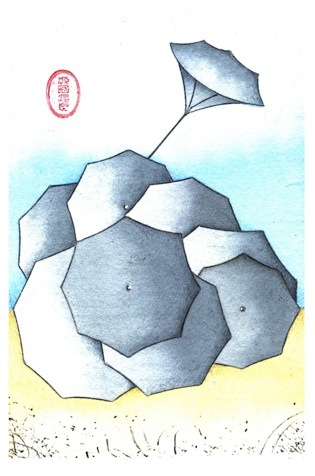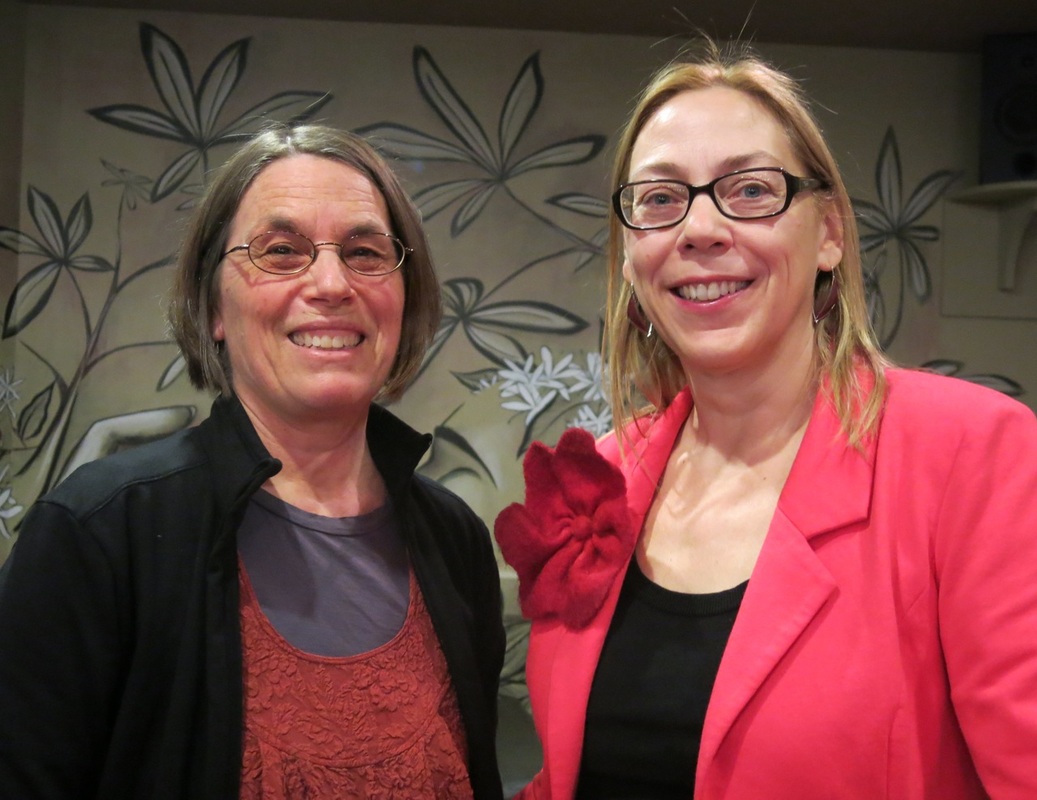FOUR POEMS BY SUSAN GILLIS
PAINTINGS BY KLAUS PFEIFFER
|
“It’s good to be back in Victoria,” said Susan Gillis stepping on stage, “to revisit old friends, places and plants I’ve left behind.” The former resident of Victoria now lives in Montreal and balances a busy schedule of teaching, writing and touring. Susan took time to thank host Yvonne Blomer, Artistic Director of the weekly reading series Planet Earth Poetry, as well as her publishers Brick Books and Gaspereau Press. Then Susan read several poems from The Rapids (Brick Books, 2012), a carefully-crafted collection of 98 poems in four sections. One of the sections: Twenty-two Views of the Lachine Rapids was published as a chapbook by Gaspereau Press in 2012. [email protected] |
|
The rapid's large standing waves generate visual drama in the river and dangerous conditions for maritime travel. This situation greatly affected the founding of Montreal. A canal bypassing the rapids was built in the 1820’s.
For Susan, the rapids represent overwhelming obstacles and perplexing events we encounter in our lives. We must figure a way around these obstacles, she explains, but step one is recognizing our dramatically altered circumstances. Drawn to ocean shores for their expansive energies, Susan misses living by the sea. She finds solace and inspiration in the ever-changing and percussive vitality of the rushing waterway. “When I look at the rapids,” she says, “I’m reminded of the boundless freedom of the ocean. It helps me feel part of a larger landscape, although I am inland in Quebec.” |
VIEW WITH HANS MEMLING’S PORTRAIT OF A YOUNG MAN
Despite his youth, he appears to be a man of some importance, perhaps a
shipping scion visiting the port. The unusual seven-eights view draws our
attention to the broad shoulders, the well-cut coat, the horn-tipped string at his collar.
His hair is dressed in the Italian style of some years earlier: the coarse
curls tamed, rolled over his brow and flowing well below his ears. Time has
eroded the bloom from his cheeks, yet his face retains its cherubic smile, the hair
the only evidence of the tiger springing inside him. Behind him the fields fall
away in a blur. From a copse of trees over his left shoulder, the river emerges
and crosses behind his neck. The sky is a streak of blue. A squall of geese clusters
below the horizon. The placid-seeming river carries delicate white shimmers of
what we take for swans.
|
VIEW WITH UMBRELLAS When did it happen, the day’s light leaning so low nothing has dimension anymore? Autumn has slipped by—suddenly the path is a ukiyo-e print, red and yellow leaves against the wet ground, thin lines a few figures hurry through huddled under umbrellas—predictable, ubiquitous umbrellas, archetypal. One of them has just blown inside out, revealing its frail frame, while above, brittle trees claw the sky. Birds take shelter under shrubs. To venture out—for milk, eggs, fruits-and-veg—means thinning to a smudge, slipping smoke-like underneath the door. |
|
SPRING STORM
Yesterday I burned the toast so I went down to the rapids. It was not a bright morning. Close to shore a small twig spun on an eddy. The eddy was frilled like a doily, and seethed. The twig was helpless to go anywhere except around and around. On the horizon plumes of smoke rose like poplar trees. There was the sun, punched into the sky like the sky’s navel. The river, pricked and lifted by windhooks. Mist puffing up, the sky black then white. Columns of air I could have walked like pathways to waiting jets, walked into the skyhold. I’m telling you: then the river reared up like a dragon, scales flapping, the sun, smoke, the far faint islands, all collapsed in the froth of its lashing. I had never been so small, atomic. I was tossed. I have to say “maelstrom.” I wanted out. I wanted time to turn back. When I felt the ground again I was shaking. It seemed I could reach in any direction and touch the opposite shore, the islands, the mist and smoke. The gaps among things had closed. I’m telling you this because I have not been able to separate them, and now all wounds are nothing, are blips, leaf-loss. Nothing resists. When I leave, understand, I will not be gone. |
|
|
|
Susan appreciates the visual representations of the poems provided by Klaus Pfeiffer. The prolonged act of looking is the thematic link in the series Twenty-two Views of the Lachine Rapids. The poet poses a question: Is it possible to create a discipline from visual recording?
Does long and careful observation render landscape more porous and open to interpretation, revealing its secrets, histories and connections? Can you be instructed to “go back to bed” by the mysterious forces that enliven and articulate the physical world? It appears so.
Susan teaches English at John Abbott college in Montreal. During the academic year, she devotes one precious hour each morning to creative writing. “This sets me up for the day ahead,” she says. In the summer months, while living in the countryside with husband and writer John Steffler, she lingers longer in a dreamy state. “Eventually, I gather pen and paper and move to my desk,” she says.
Susan relishes the kinetic energy of pen moving across paper, putting down words. She is adaptable and can write anywhere. Stimulated by nomadic wanderings in Greece, Turkey and Europe she savours the creative insights found in new locales. With her inquiring mind and finely-tuned radar, the poet scans each new situation, conjuring images out of silence onto the waiting page.
Does long and careful observation render landscape more porous and open to interpretation, revealing its secrets, histories and connections? Can you be instructed to “go back to bed” by the mysterious forces that enliven and articulate the physical world? It appears so.
Susan teaches English at John Abbott college in Montreal. During the academic year, she devotes one precious hour each morning to creative writing. “This sets me up for the day ahead,” she says. In the summer months, while living in the countryside with husband and writer John Steffler, she lingers longer in a dreamy state. “Eventually, I gather pen and paper and move to my desk,” she says.
Susan relishes the kinetic energy of pen moving across paper, putting down words. She is adaptable and can write anywhere. Stimulated by nomadic wanderings in Greece, Turkey and Europe she savours the creative insights found in new locales. With her inquiring mind and finely-tuned radar, the poet scans each new situation, conjuring images out of silence onto the waiting page.
|
Susan Gillis gratefully acknowledges Brick Books for tour assistance. Susan’s books are available at: Brick Books www.brickbooks.ca & Gaspereau Press www.gaspereau.com. |
Web Design, Content and Photos:
Kate Cino previewed arts events for 18 years at Boulevard magazine.
For ten years she operated an art & framing shop.
She has a History in Art degree and Public Relations certificate from the University of Victoria.
[email protected] 250 598-4009








